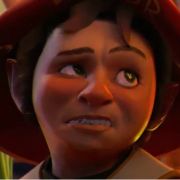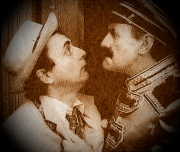|
Omi no Kami posted:I could use a bit of advice about structuring my first act. The story I'm working on is a episodic spy thriller- there's a problem, the team goes on a big, dumb mission to figure out what's going on and stop it, they rest, then a new problem appears. In my first draft I actually start with the viewpoint character getting recruited, and they spend about 20,000 words at spy hogwarts making friends and learning how to pick locks and murder dudes. I like the section, because it really helps you empathize with the protagonist by following them on their journey from normal goober to james bond, but it's a really weird island of content. From the instant they graduate they're in a by-the-numbers spy procedural, and my kneejerk reaction is to say that if that's where the bulk of the book lives, I should toss the deep end and just start the book with them doing what they'll do for the entire story. Would you be able to start seeding the by-the-numbers spy procedural mission in the first act? Have the protagonist slowly become aware of the situation unfolding in the outside world while they learn, have them hear whispers and rumors from professors and other students about a political crisis, have them watch news reports of growing external tension, etc. Then when they're assigned the mission both they and the reader have context on what the stakes of the mission are? It will keep the two parts from feeling too disconnected and will actually build an anticipation for when the actual spycraft hits. You could also just straight-up assign them the mission early on in the book and have them train specifically for the things they may encounter on that mission. Alternatively, not to say it's necessarily a good idea because it could go very wrong, if you're open to making it a tad nonlinear you could also intercut between the mission and the school days, as long as the flashbacks to training are additive. Basically present the character with a challenge on their mission, flash back to their training where they learned a lesson on how to address that challenge, and then jump back to the mission where they execute on that lesson. It would give a nice balance for when you show them as a highly competent superspy to cut back to when they were Just Some Guy who didn't know how to take the safety off their gun. But with this you risk pulling the user out of the action and breaking the tension. e: and it all goes back to what you want to write and what you feel your readers will want to read. Are you excited about the Spy Hogwarts story and do you think that's a draw for your readers? Or are you only putting it in there to endear your readers to the character? Is your intended audience YA fans, spy novel fans, or both? My reading of your question is that you want it to be both. It's a bit of a differentiator compared to most other spy books out there, which would make it stand out a bit more in the crowd—though I'm not exactly in touch with this subgenre, so it could already be well-trod territory. I know there was a popular Young James Bond series not long ago that may cover similar material. And I'd imagine "Harry Potter but for X" is its own subgenre by now. But if you're only putting in the Spy Hogwarts stuff for expositional purposes, cut it. Or, if you really like the Spy Hogwarts stuff and are just tacking on the mission because that's what you're "supposed to do" in an espionage yarn, then beef up the schooling and compress the mission into just the third act. But I think that Harry Potter is a good reference point, here, because the "mission" in those books is fully integrated into the "schooling" portions so that they feel like one cohesive story and constantly bounce off of each other. feedmyleg fucked around with this message at 15:18 on Dec 13, 2018 |
|
|
|

|
| # ? May 10, 2024 12:36 |
|
Omi no Kami posted:I could use a bit of advice about structuring my first act. The story I'm working on is a episodic spy thriller- there's a problem, the team goes on a big, dumb mission to figure out what's going on and stop it, they rest, then a new problem appears. In my first draft I actually start with the viewpoint character getting recruited, and they spend about 20,000 words at spy hogwarts making friends and learning how to pick locks and murder dudes. I like the section, because it really helps you empathize with the protagonist by following them on their journey from normal goober to james bond, but it's a really weird island of content. From the instant they graduate they're in a by-the-numbers spy procedural, and my kneejerk reaction is to say that if that's where the bulk of the book lives, I should toss the deep end and just start the book with them doing what they'll do for the entire story. Does the opening serve an important purpose in terms of character development, plot development, or being fun to read? If yes then IMO keep it. If not, then don't.
|
|
|
|
Omi no Kami posted:I could use a bit of advice about structuring my first act. The story I'm working on is a episodic spy thriller- there's a problem, the team goes on a big, dumb mission to figure out what's going on and stop it, they rest, then a new problem appears. In my first draft I actually start with the viewpoint character getting recruited, and they spend about 20,000 words at spy hogwarts making friends and learning how to pick locks and murder dudes. I like the section, because it really helps you empathize with the protagonist by following them on their journey from normal goober to james bond, but it's a really weird island of content. From the instant they graduate they're in a by-the-numbers spy procedural, and my kneejerk reaction is to say that if that's where the bulk of the book lives, I should toss the deep end and just start the book with them doing what they'll do for the entire story. Establishing "the normal world" is important for a story. The more unusual the protagonist's "normal world" is from ours, the more you need to spend fixing it in the reader's head before your plot goes and blows it all up. But the length you have there could be a problem. I think most published novels are roughly 100,000 words. I'm concerned that you're spending one-fifth of the novel at the spy school. What you should be thinking of is rising tension. Where is the tension in the spy school part, where's the danger and excitement? Think about what the stakes are, what happens if the new recruit fails? I actually have a similar issue with my book, in that I have an extended sequence which is set five years before the bulk of my novel, and - at least in this version - I'm not even able to introduce my second protagonist in that part either. In my case, I'm leading off with my lead character discovering a dead body, then flashing back two days to establish the "normal world", so boom, tension is established. The reader will wonder "who is the body". My next step is I give a bunch of possibilities by showing my main character interacting with several people to show what they are like, to hopefully make the readers care, but those scenes don't just serve as character introduction, they also add tension by threatening to take away what my main character wants the most. EDIT: And obviously my stuff at the start is absolutely vital to the main plot and establishing the main villain. In your case, I think you'd need to tie the school stuff into the main plot somehow. Betrayal is an integral part of many spy thrillers. Is one of the members of the team going to betray the team? If you could hint at that early on, then drop in clues and red herrings foreshadowing that later into your spy school section, it might help keep the reader's interest. feedmyleg's post is good as well. Stabbey_the_Clown fucked around with this message at 16:37 on Dec 13, 2018 |
|
|
|
Omi no Kami posted:I could use a bit of advice about structuring my first act. The story I'm working on is a episodic spy thriller- there's a problem, the team goes on a big, dumb mission to figure out what's going on and stop it, they rest, then a new problem appears. In my first draft I actually start with the viewpoint character getting recruited, and they spend about 20,000 words at spy hogwarts making friends and learning how to pick locks and murder dudes. I like the section, because it really helps you empathize with the protagonist by following them on their journey from normal goober to james bond, but it's a really weird island of content. From the instant they graduate they're in a by-the-numbers spy procedural, and my kneejerk reaction is to say that if that's where the bulk of the book lives, I should toss the deep end and just start the book with them doing what they'll do for the entire story. I don't think you should cut the Spy Hogwarts at all, but you need to use that poo poo to show us what makes your spy team special when compared to other spies. Think like the training section of Kingsman - we learn from it that Eggsy is a rough fuckin survivor who thinks out of the box, and this comes into play in the Main Mission. We also learn who else is a player in the story, and how competent they are, so that when you see characters again they're not just extra "whatever" named spies but they're formidable allies - or foes. If your story has room for a training arc and you're not using that to secretly set up all the players for the rest of your story then honestly work on the rest of your whole drat story to fit things in.
|
|
|
|
I could definitely seed the situation in the first act! Without going into too much detail I'm trying to set it up like a fieldwork version of the civilian codebreakers at Bletchley Park, where the protagonists each have the same mission-critical affinity that can't be reliably trained, which led the agency to screen students/soldiers/civil servants and train the best candidates in as much intelligence gathering and tradecraft as they can before circumstances depend they go into the field. Right now one of the big purposes of the spy hogwarts section is to build the threat up- they haven't been told what the common trait they all have is, so they're just running around picking up a mixture of tradecraft and seemingly random skills as their trainers drop increasingly unnerving bits of information as they progress, culminating in a post-graduation briefing where whomever made it gets sat down and shown a boring, low-budget slideshow about the terrifying nonsense they're going to be looking into. (I also considered doing this briefing right when they arrive, so the whole training section is motivated by 'Oh crap, this is really serious', but I'm trying to keep a lot of the tradecraft elements grounded, and in real life they would never brief training candidates on operational details, especially if they knew that a certain percentage of the class would inevitably quit or fail out. I'm reasonably sure it'll be interesting reading, and I definitely like writing extended training/mission prep stuff, I think the main issue is keeping the transition from becoming too jarring; out of necessity the training will need to be pretty fast-paced, since we're covering years of experience in probably 2-3 chapters, but once we get to the actual spy stuff it's going to become much more deliberate, and probably the entire book will only cover a couple of months in the field. I suspect they'll work together, mainly because both ideas sound fun, but the main reason I want to start them at spy hogwarts is because writing that section sounds really entertaining to work on. Whalley posted:I'm probably not your audience, but just hearing this makes me want you to focus 1000% on Spy Hogwarts, gently caress a real mission. That's actually really good to hear- the idea seems really fun to me, but since audience-wise it's a lot closer to Kingsmen than anything YA (adults who like spy stuff, but are not above having some fantastic, goofy nonsense in their plots) I was worried that not keeping things laser-focused on "Please enjoy these spies doing spy things" would result in too much drift. Omi no Kami fucked around with this message at 16:09 on Dec 13, 2018 |
|
|
|
Are they spending 2-3 years training for a specific mission? If so, I'm not sure how much sense that makes. I mean, one could certainly spend a few years getting moles and spies to patiently worm their way up enemy ranks, but a specific "wetwork" operation being planned out years in advance seems questionable, lots of things about the situation could change during the training.
|
|
|
|
Stabbey_the_Clown posted:Are they spending 2-3 years training for a specific mission? If so, I'm not sure how much sense that makes. I mean, one could certainly spend a few years getting moles and spies to patiently worm their way up enemy ranks, but a specific "wetwork" operation being planned out years in advance seems questionable, lots of things about the situation could change during the training. Nope, they're expected (or at least encouraged) to be career agents. They're all being trained to find and deal with a new and exciting type of technology that hostile agencies have started using, but that's more of an accent on top of a much more standard package of surveillance, physical intrusion, codebreaking, recruiting and managing humint assets, and so forth. Once they're actually trained and proficient the story is basically going to be the intelligence equivalent of a monster of the week thing- "Huh, one of our agents was found dead in his office in the middle of the day, his blood got replaced with live and very angry bees, and none of his coworkers remember that he used to work here- this sounds like a 'you guys' kind of job."
|
|
|
|
tacodaemon posted:this guy is taking over the writing of the Ms. Marvel comic from Willow Wilson and he wants to know how to write a teenage girla nd this is a heck of a thread This is a bangin twitter thread if you want to write female characters better.
|
|
|
|
There's a free book out there for RPG gamemasters that says you should never, ever let your players roleplay as a different gender - it's just too difficult. They can be other species, they can be robots or sentient clouds, but this is one thing that people can never fully comprehend. Direct quote - "men really are from Mars and women really are from Venus." I'm sure this whole "asking people about their experiences, listening to them, and keeping them in mind" thing would give this guy a stroke.
|
|
|
|
That free book sounds dumb.
|
|
|
|
It is, but sometimes something that's just so intractably wrong sticks in your head like the finest kernel of truth.
|
|
|
|
After The War posted:There's a free book out there for RPG gamemasters that says you should never, ever let your players roleplay as a different gender - it's just too difficult. They can be other species, they can be robots or sentient clouds, but this is one thing that people can never fully comprehend. Direct quote - "men really are from Mars and women really are from Venus." Lolwut
|
|
|
|
A gamer with bad views on gender Be still my beating heart
|
|
|
|
Just wanted to pop in here and say that I got my very first query rejection today. It hurts since it's a new experience but I know there's probably going to be a hundred of these before I either find someone who likes my story or decide that it's time to bury this book and start fresh. I'm only sad I can't channel this pain into more querying because now everyone's closed for the winter.
|
|
|
|
Getsuya posted:Just wanted to pop in here and say that I got my very first query rejection today. It hurts since it's a new experience but I know there's probably going to be a hundred of these before I either find someone who likes my story or decide that it's time to bury this book and start fresh. I'm only sad I can't channel this pain into more querying because now everyone's closed for the winter. Congratulations! You sent your material out and received a response! Not a good response, but that's fine, at least it got paid attention to! Now keep doing it you gently caress. Don't be like me and sit on dozens of unread, never-to-be-published manuscripts because deep down inside you know that it's unreadable trash that isn't even suitable to be shredded and used for bird cage lining.
|
|
|
|
Getsuya posted:Just wanted to pop in here and say that I got my very first query rejection today. It hurts since it's a new experience but I know there's probably going to be a hundred of these before I either find someone who likes my story or decide that it's time to bury this book and start fresh. I'm only sad I can't channel this pain into more querying because now everyone's closed for the winter. here ill share some rejections to get you back on your feet Hi Getsuya, Thanks so much for the opportunity to consider your post! While I found your premise intriguing, this post just doesn't feel quite right for me. This industry is so subjective, and undoubtedly another poster will feel differently! I wish you the best of luck in your posting endeavors and in finding post representation. Best, The forums
|
|
|
|
Aww but I thought my post would be right up your alley based on your last PWL (Post Wish List) tweet. Seriously though it’s scary how close the wording is to the rejection I got. The formest of the form.
|
|
|
|
This may not be good for your ego: http://www.rejectionwiki.com/index.php?title=Literary_Journals_and_Rejections A wiki on rejection letters, don't read too much into it though.
|
|
|
|
Getsuya posted:Aww but I thought my post would be right up your alley based on your last PWL (Post Wish List) tweet. I just copied that from my inbox. I've got literally hundreds of them if you want to see more, but there's basically two groups. 1) the one that's filled with a ton of absolutely basic info thats horrificlly condescending to anyone who's put more than five seconds of thought into their submission, and 2) the bare minimum blowoff. Both of these are somehow better than radio silence, which is what you can expect from about half the agents you submit to. Examples of both fun and exciting styles: I don't want to rep your book, but you can pay me to edit it! posted:Dear Nae!, no posted:This is not right for me, but thank you for the look.
|
|
|
|
yeah there’s basically three types of rejection: generic, generic but slightly nicer, and the personal “this was good but wasnt a fit for us” w/ maybe some feedback in it or a please sub to us again w/ a note saying we liked you
|
|
|
|
Don't forget the always-popular "never hearing back from them" rejection.
|
|
|
|
My brother-in-law runs a religious publishing company. He says he sometimes gets submissions that he wishes he could reject with "Dear idiot: Where do you get off writing this tripe? Go away." But of course he has to be professional about it, and just shoots them a generic rejection letter instead. I always think of that every time I get a "Not for us right now" rejection.
|
|
|
|
Soon, you'll move up from the standard rejection to someone asking for a Full, and then you get the Full "I didn't love this like I needed to to rep it" Rejection letter!
|
|
|
|
sebmojo posted:This is a bangin twitter thread if you want to write female characters better. This is A+ real fukkin' good poo poo.
|
|
|
|
Axel Serenity posted:Soon, you'll move up from the standard rejection to someone asking for a Full, and then you get the Full "I didn't love this like I needed to to rep it" Rejection letter! oh if you want those, i've got those too! they included such classics as 'I can't be the one to rep it but I will be the first to buy it' and 'I'm sure you'll have no trouble landing another agent, but I won't be passing it along or making any recommendations and you shouldn't email me back'
|
|
|
|
I got a story published in Ellery Queen and with this one they've used it as one of this month's issue previews, so you can read the first third of it online for the next little while. It's a traditional Sherlock Holmes pastiche. I've actually found this thread really helpful (especially the mega-OP) in becoming a better writer, so I wanted to say thanks to the gang as well. Two professional sales so far. Xotl fucked around with this message at 20:03 on Feb 12, 2019 |
|
|
|
Xotl posted:I got a story published in Ellery Queen and with this one they've used it as one of this month's issue previews, so you can read the first third of it online. It's a traditional Sherlock Holmes pastiche. OP will take an as-yet-to-be-determined percentage, TIA.
|
|
|
|
I'd like to rant for a minute among some people who might get the feeling, because, news at 11, writing is hard and making a career out of it is frustrating. When I was in college I could write hundreds of words of fiction in a day, multiple days a week. It was mostly bullshitting stuff with friends, but it also led to me writing a couple short stories that I managed to get published (definitely in large part because my now-estranged mother was the one requesting stories from people and editing them into a collection, but hey, I still wrote something decent nonetheless) and developing a writing style and themes that I overall feel pretty good about. Now that I don't have an English degree requiring me to read and talk about 10 books a month, dropped out of the bullshitting I'd do with friends, and have a 40-hours-a-week job, I've definitely slacked on the reading and writing front. It's especially bad now that I'm really trying to put in work for the two novels I've developed and really want to get out there. It took me a couple of years to find an outline writing method that actually worked for me, and I managed to get a 1,000-word summary down for one of the novels in two days. Then it took me months of fumbling with an introduction until I finally got the mentality of "gently caress it, get garbage out of your head and down on a page and fix it later, no matter where it is in the story" drilled in and slapped down about 4,000 words over a few days off and a few slow work days. It's incredibly slow progress, but it is progress, and putting it down here actually makes me feel a little better about what I've managed so far. The problem is that, despite how passionate I am about these things, actually working on them is much more of an ordeal than it used to be. I listen to music in the car for inspiration and come up with scenes and even dialogue that I think would be great, but when I actually sit down the words never end up on the page as well as I think they would in my head, or they're decent but it's a struggle just to get them down. Progress has been pretty good on that one novel, and I'm keeping everything I put down because it's a first draft and I can fix it up later, but the quality of what I'm getting down bleeds out into making me doubt the story and characters themselves. The same feeling has been getting into other projects I want to work on that aren't nearly as serious, like a backstory for a D&D character: either I struggle to get anything down, or I do and I kinda hate it and everything else by extension. I already knew that I would struggle with a longer writing project because I'm bad at settling on a point to start anything with, but I used to be able to struggle briefly with an opening and then let everything else flow pretty easily afterward. Then I get stupid thoughts like "I should be working on this project instead, the tones and messages in it would be a lot more applicable to what people are going through in the world now," or "if I'd started this sooner I probably could've been finished by now and had something out there," and deeper and deeper from there. There've been more than a few days off or slow days at work lately where I've planned to make progress in something, then sat down and actually stared at a page for a while and just went "...gently caress." I feel like I'm having to relearn everything that was almost instinctual just a few years ago, and I think that's what's most frustrating about all this. My only comparison point for how the stuff I'm doing should be looking now is how my stuff looked years ago when I was working on much shorter, more personal projects in a very different environment. I should probably look into some examples of what a first draft normally looks like and stick to the outlining process more. I've never been good at the editing process, so that's probably coming to a head now. I'm still gonna stick with it to the bitter end, even if that means I don't actually finish anything until I'm retired, but it just sucks.
|
|
|
|
Squidtentacle posted:I'd like to rant for a minute among some people who might get the feeling, because, news at 11, writing is hard and making a career out of it is frustrating. Over the last 10 years I've been through a very similar process to the one you have described, and I have come out the other side of it - there is light at the end of the tunnel, and it's not just the headlights of an oncoming train. That said, I'm not a professional, published author, so take this with a grain of salt. In my late teens and early 20s I could - and did - write entire novels in the span of a few weeks, just churned out tons of stuff at very high speed, but I ground to a halt for years when I started to take writing seriously, when I started to critique my own work, recognise shortcomings and flaws and dislike what I was putting on the page, dislike the quality. I didn't know how to fix things, how to make art that I was proud of or happy with, and this was frustrating and I felt defeated for a long time. But the important thing is I kept writing and thinking. Even when I knew it was bad, even when I didn't know how to make it good. You say "I feel like I'm having to relearn everything that was almost instinctual just a few years ago", and yes, exactly! That is exactly how I felt and what it was like, and I've come to believe that feeling was based in a false sensation of writing being easy when I understood less. But eventually that feeling morphed into something else, though I can't pinpoint the exact moment that happened. I can't point to one project where I suddenly felt competent again. It was a slower, creeping change, subconscious perhaps. I'm not claiming that I'm great, or even good, just that it feels different. I can look at my work and feel a degree of confidence again, and I credit that 100% to writing millions of words and spending a gigantic amount of intellectual effort on critique and understanding. Don't feel like your efforts are wasted. Keep writing.
|
|
|
|
Hungry posted:Don't feel like your efforts are wasted. Keep writing. Thank you for the encouragement! Yeah, I'm definitely not giving up. I just need to stop comparing what I'm doing now to what I used to do. I'm sure the quality will improve with the work I put into it; it's just a matter of keeping up with the process. I'm glad you were able to settle into the right space with your work, and hopefully I'll get there sooner rather than later.
|
|
|
|
Squidtentacle posted:hopefully I'll get there sooner rather than later. Yeah! I just realised how it might sound when I said it took me a whole decade to reach a good place, but there's really no reason it should take that long. I had negative outside factors involved, to put it lightly.
|
|
|
|
Since we're talking query letters, a couple questions: Finding agents- what's a good strategy for finding the agents for similar novels? So far I've found the novels on Amazon and then tried to see if they mention their agent in the book's acknowledgements. I haven't submitted a ton, but I've gotten a lot of "this isn't the right project for me" ones, which may just be a form letter, but which lead me to think my query isn't getting to the right agents. Is it worth going to conferences/meetings to meet agents? I get the sense they mostly are useful for writers to network.
|
|
|
|
Glass of Milk posted:Since we're talking query letters, a couple questions: Conferences are fantastic places to meet agents, so long as you scope out which agents will be there ahead of time. If you write sci-fi and it turns out all the agents there are into regency romance, you've wasted your time. As for the form letters, that doesn't mean anything. I sent out an LGBT Fantasy western to an agent who was specifically requesting LGBT fantasy westerns and got a form rejection three months later. Forms don't tell you poo poo beyond 'this agent isn't interested in this particular book on this particular day'. That's it. Trying to divine more meaning beyond that will drive you absolutely insane.
|
|
|
|
Another form letter rejection. My query is just not interesting enough, perhaps. With seven misses it's time to rework it, I guess.
|
|
|
|
You can always post it in here and get feedback so you're not too inside your own head on it.
|
|
|
|
Nae! posted:You can always post it in here and get feedback so you're not too inside your own head on it. That would be great, actually. Here's the original query: Dear Mr./Ms. X <Why I'm querying this agent specifically> It’s a cold November morning in the year 1917. When a visitor arrives to fifteen-year-old Robert’s house with the news that his father was lost while fighting in the skies over France, his life is shattered. His only hope appears when a mourner at his father’s funeral offers Robert an opportunity: to try and find his father, to avenge him, and perhaps to save his soul from despair. Robert’s decision is made from both parts desperation and naivety, but he nonetheless sets out on the adventure of his young life, armed only with the promises of the man who had failed to keep his father safe. At first, everything seems to go according to plan, but once he sets foot in France, things begin to unravel. The story that Robert had foreseen for himself disappears as reality intrudes. Questions about his age and his orders lead to danger, even to his very life. And when it seems he’s on the cusp of achieving his goals, he finds out the limits of influence. The choices that he makes, the failures he suffers and the people that he trusts along the way will determine whether he can find the answers that he needs to discover about his father and will forever change the man that he will become. ACROSS THE BREACH is a historical fiction novel of 72000 words. It is my first novel. I am an amateur carpenter and brewer, a lover of history and most importantly, a father to a 6-year-old daughter and an overweight cat. Again, thank you very much for your time and consideration. Sincerely, Glass of Milk So I think it's not very interesting or grabbing, and doesn't highlight that the story (attempts to) subvert the trope by having him basically fail. The new query (so far) is: Dear Mr./Ms. <X>, <Why I'm querying this agent specifically> It’s a cold November morning in the year 1917. When a visitor arrives to fifteen-year-old Robert’s house with the news that his father was lost while fighting in the skies over France, his life is shattered. Robert’s only hope appears when the man who failed to keep his father safe offers him an opportunity: to try and find his father, to avenge him, and perhaps to save his soul from despair. His comfortable life left behind, Robert begins his journey auspiciously enough, but once he reaches France, the easy path that he had envisioned disappears. He is quickly thrust into the realization that he is a boy in a conflict much larger and much more dangerous than he could have imagined. Robert’s choices, his failures and the people he meets will determine if he can overcome the dangers to find the answers he’s seeking, and whether he can find the revenge he increasingly desires before the war ends. ...(personal stuff, book stats and signature) Feels a little better but I still want to highlight his uncomfortable and growing need for revenge a bit more. Labeling it historical fiction is also a question in my mind- while the setting, timeline, locations and things he interacts with are historically accurate, they're merely props for the story. For the new query I'm really searching for that first line pop that will grab attention, and that may be the revenge aspect.
|
|
|
|
Ah yeah, I can see why this wouldn't be grabbing people. You have not properly set up stakes which matter. All your query contains is setup for the story, but not enough information about the story itself. The actual story is Robert searching for his father or his father's killer while a war is still raging on, but you stop giving any detail before the story begins.Glass of Milk posted:It's a cold November morning in the year 1917. When a visitor arrives to fifteen-year-old Robert's house with the news that his father was lost while fighting in the skies over France, his life is shattered. His only hope appears when a mourner at his father's funeral offers Robert an opportunity: to try and find his father, to avenge him, and perhaps to save his soul from despair. I'm a little confused here. What does this stranger mean "try and find his father"? Is Robert's father dead or only presumed dead? I guess they're holding a funeral with an empty casket? What happened to Robert's father is the key motivating event, and it's not clear what this stranger has said. Is this a mission to find Robert's father or to get revenge? It sound like Robert's father was a pilot, presumably a soldier fighting in the war. Robert sound like someone old enough to understand that war is very, very dangerous and those who are fighting in the war can die. It's certainly a horrible, life shattering event, but revenge against a soldier just doing their job - just like Robert's father - is a motivation that strikes me as somewhat childish? Maybe that's just me? quote:The story that Robert had foreseen for himself disappears as reality intrudes. Questions about his age and his orders lead to danger, even to his very life. And when it seems he’s on the cusp of achieving his goals, he finds out the limits of influence. This is very vague, it doesn't tell me anything about the specific problems. What story did Robert see for himself? Heroically bringing his father back from behind enemy lines? Bringing back the head of the one who killed him? I don't know. In what way is reality intruding? Of course his life might be in danger if he's going into a war zone to look for his father. Is there anything else at stake besides his life? What, exactly, is Robert's goal? That's what the book is about. It should be clear, not vague. Why is his age a question? Is he joining the military? I don't know. What does "limits of influence" mean? I have absolutely no idea. Form rejection. quote:The choices that he makes, the failures he suffers and the people that he trusts along the way will determine whether he can find the answers that he needs to discover about his father and will forever change the man that he will become. Also very vague. What choice does he have to make? You don't have to say what the failures are and which people he trusts, but vagueness like that does not belong in a query. What are the answer he needs? What does he need to discover about his father? Why do I care about the man Robert will become? That's not an interesting enough question to make me want to read the book now. I need a better sense of your character's dilemma. Form rejection. Have you looked at Query Shark? That should have a lot of examples of queries which don't work, and ones which do. quote:Who is the protagonist? Stabbey_the_Clown fucked around with this message at 23:34 on Jan 4, 2019 |
|
|
|
Thanks for the advice, I do really appreciate it. It's in fact queryshark that led me to be intentionally vague- I'd seen a lot of overly descriptive queries that gave away the whole novel and went too far in the opposite direction, but you're spot on in identifying that weakness. Robert is childish, a teenager, and prone to the irrational behavior that teens show- for him his father's death (even in war) is nothing less than a murder. It's the same mindset that leads him to think his father could be alive though all evidence is against it and his expectation he'll show up immediately and victoriously defeat his father's killer. He's on a fool's errand to save his father, and barring that, avenge him, but he's too naive to realize he's basically doomed from the start. All of which I don't mention in the query and probably should. The best question is what will happen if he fails- part of the point of the story is that whether he succeeds or fails, he'll find that revenge can't bring closure. Again, phrased correctly that's a good part to bring up. Thanks again, I think I've got a bit of noodling to do on this letter (and the story as well). Glass of Milk fucked around with this message at 01:33 on Jan 5, 2019 |
|
|
|
Glass of Milk posted:Thanks for the advice, I do really appreciate it. It's in fact queryshark that led me to be intentionally vague- I'd seen a lot of overly descriptive queries that gave away the whole novel and went too far in the opposite direction, but you're spot on in identifying that weakness. Okay, but presumably in the novel proper, his actions won't make him seem like he's too dumb to live. There's a line between courage and foolishness and I fear Robert may be straying a bit far over the line. I'm sure he has some good qualities. Maybe try to bring some of those closer to the surface in the query. I actually disagree that those are the things you should mention in the query, those things are how the story ends. You only need to set up how the story starts. quote:The best question is what will happen if he fails- part of the point of the story is that whether he succeeds or fails, he'll find that revenge can't bring closure. Again, phrased correctly that's a good part to bring up. Again, that's a conclusion, part of the ending and that doesn't belong in the query. Your letter should entice the agent to want to read more, not tell them how it ends. One writing book I read recently said that great novels combine high personal stakes with high "public" stakes. Whether or not your hero gets revenge is a personal stake. Public stakes are things which have consequences for the wider world, for example, if the Germans win WW1 or force a allied stalemate would be an example of a public stake. One last thought on "[These events] will forever change the man that he will become". That statement feels obvious. Usually the events of a novel should be important enough to forever change the protagonist (certain genres excepted). If they don't, why write about them at all?
|
|
|
|

|
| # ? May 10, 2024 12:36 |
|
Stabbey_the_Clown posted:Okay, but presumably in the novel proper, his actions won't make him seem like he's too dumb to live. There's a line between courage and foolishness and I fear Robert may be straying a bit far over the line. I'm sure he has some good qualities. Maybe try to bring some of those closer to the surface in the query. No, he's not a headstrong moron, at least I don't think so, but he's very susceptible. Another read-through can never hurt. Stabbey_the_Clown posted:I actually disagree that those are the things you should mention in the query, those things are how the story ends. You only need to set up how the story starts. I really want to avoid making it a list of things that happen, but I take your meaning. I guess I'm trying to approach it like the book blurb, and I guess it's a little more informative than that. Stabbey_the_Clown posted:One writing book I read recently said that great novels combine high personal stakes with high "public" stakes. Whether or not your hero gets revenge is a personal stake. Public stakes are things which have consequences for the wider world, for example, if the Germans win WW1 or force a allied stalemate would be an example of a public stake. That's food for thought. I'll have to think about that- a historical novel has set parameters for the wider world (i.e. the Germans lose WW1), but there are the people around him who could be affected, plus the people he left at home. Thanks again!
|
|
|





















